Unit 7: Global Warfare Study Guide Overview
This unit explores global conflicts from 1900 to the present‚ focusing on political‚ economic‚ and social factors driving warfare. It examines key events‚ technological advancements‚ and the rise and fall of empires‚ providing a comprehensive understanding of modern warfare’s impact on societies and international relations.
Global warfare from 1900 to the present encompasses transformative conflicts that reshaped the world. This period saw the rise of industrialized warfare‚ ideological struggles‚ and the emergence of superpowers. World Wars I and II dominated the early 20th century‚ driven by nationalism‚ imperialism‚ and economic rivalries. The Cold War followed‚ marked by ideological tensions between capitalism and communism. Key themes include the role of political ideologies‚ technological advancements‚ and the human cost of conflict. Understanding these events provides insight into how global power dynamics‚ economic systems‚ and societal structures have evolved. This introduction sets the stage for exploring the complexities of modern warfare and its enduring impact on international relations.
Key Concepts and Learning Objectives
Key concepts in this unit include understanding the causes and consequences of global conflicts‚ analyzing the role of political‚ economic‚ and social factors‚ and evaluating the impact of technological advancements. Students will learn to identify and explain the major events and ideologies that shaped warfare from 1900 to the present. Learning objectives focus on developing critical thinking skills to analyze historical patterns‚ assess the role of international organizations‚ and understand the shifting global power dynamics. By the end of this unit‚ students will be able to connect historical events to contemporary issues‚ demonstrating a comprehensive understanding of global warfare’s legacy and its influence on modern international relations.
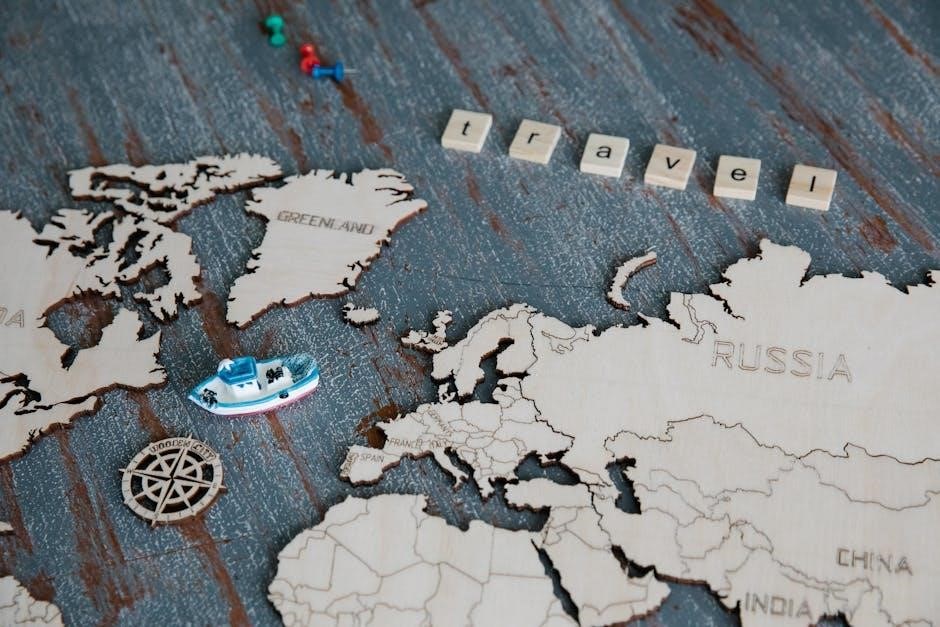
Causes of Global Warfare
Political factors like imperialism and nationalism‚ economic factors such as colonialism and resource competition‚ and social factors including ethnic tensions and propaganda are key causes of global warfare.
Political Factors: Imperialism and Nationalism
Imperialism‚ the pursuit of colonies and resources‚ fueled global tensions as nations competed for dominance. Nationalism‚ emphasizing national identity and pride‚ often led to aggressive foreign policies. These factors intertwined‚ creating rivalries and alliances that escalated conflicts. Imperial powers sought to expand their influence‚ while nationalist movements challenged existing borders and authority. Such dynamics were central to the outbreak of World War I and II‚ as well as Cold War proxy conflicts. The collision of imperial ambitions and nationalist ideologies destabilized international relations‚ making warfare more likely. Understanding these political factors is crucial for grasping the roots of global conflicts and their enduring impact on modern geopolitics.
Economic Factors: Colonialism and Resource Competition
Colonialism and resource competition were significant economic drivers of global warfare. European powers‚ along with other nations‚ sought to expand their empires to secure raw materials‚ markets‚ and trade routes. This competition often led to tensions‚ as countries vied for control over valuable resources like oil‚ minerals‚ and agricultural products. Colonial exploitation created economic rivalries that destabilized international relations. Additionally‚ the pursuit of resources fueled military build-ups and alliances‚ heightening the likelihood of conflict. These economic motivations played a crucial role in both World War I and II‚ as nations sought to protect or expand their economic interests. Resource competition remains a key factor in understanding the economic underpinnings of global warfare.
Social Factors: Ethnic Tensions and Propaganda

Ethnic tensions and propaganda were pivotal social factors in global warfare. Ethnic divisions often fueled conflicts‚ as groups sought self-determination or dominance‚ leading to violence. Propaganda amplified these tensions by spreading biased narratives‚ demonizing enemies‚ and uniting populations behind war efforts. Governments and media exploited fears‚ creating a climate of mistrust and hostility. This manipulation of public sentiment justified aggressive policies and mobilized support for military actions. Ethnic hatred and propagandistic manipulation played significant roles in both World Wars‚ fostering nationalism and dehumanizing adversaries. These social dynamics continue to influence modern conflicts‚ highlighting their enduring impact on global warfare.
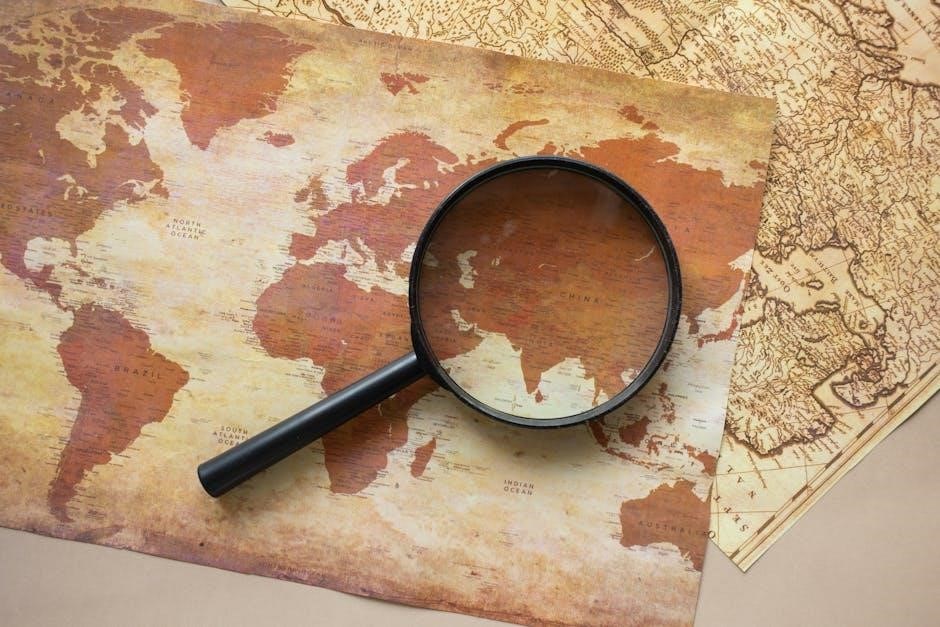
Major Global Conflicts
Understanding major global conflicts‚ such as World War I‚ World War II‚ and the Cold War‚ is crucial for analyzing their profound impact on international relations and political landscapes.
World War I: Causes and Key Events
World War I (1914–1918) emerged from a complex web of political tensions‚ imperial ambitions‚ and alliances. The assassination of Archduke Franz Ferdinand by a Serbian nationalist ignited the conflict‚ triggering a chain reaction among European powers. Key events included the Battle of the Marne‚ the introduction of trench warfare‚ and the United States’ entry in 1917. The war witnessed unprecedented destruction‚ with millions of casualties and the widespread use of new technologies like machine guns and chemical weapons. The Treaty of Versailles (1919) ended the war but imposed harsh penalties on Germany‚ sowing seeds for future conflicts. The war reshaped global power dynamics and left deep societal scars.
World War II: Major Theaters and Turning Points
World War II (1939–1945) spanned multiple theaters‚ with key battles in Europe‚ the Pacific‚ North Africa‚ and the Eastern Front. Major turning points included the Battle of Stalingrad (1942–1943)‚ which halted Nazi advances in the East‚ and the Battle of El Alamein (1942)‚ marking a shift in North Africa. The Battle of Midway (1942) in the Pacific decisively weakened Japan‚ while D-Day (1944) in Normandy opened the Western Front. The Holocaust‚ systematic persecution of Jews‚ occurred under Nazi rule. The war concluded with the atomic bombings of Hiroshima and Nagasaki (1945)‚ leading to Japan’s surrender. These events reshaped global power structures and highlighted the horrors of modern warfare.
The Cold War: Ideological Conflicts and Proxy Wars
The Cold War (1947–1991) was an ideological conflict between the United States and the Soviet Union‚ centered on capitalism versus communism. Key events included the Iron Curtain speech by Winston Churchill‚ symbolizing the division of Europe‚ and the Berlin Blockade (1948–1949)‚ where the Soviets restricted Western access to Berlin‚ prompting the Berlin Airlift. Proxy wars‚ such as the Korean War (1950–1953) and the Vietnam War (1955–1975)‚ reflected indirect superpower confrontations. The Cuban Missile Crisis (1962) brought the world to the brink of nuclear war. The Cold War also saw a space race‚ culminating in the U.S. moon landing‚ and an arms race that escalated nuclear arsenals. Its conclusion came with the Soviet Union’s collapse‚ reshaping global power dynamics and ending with the U.S. as the dominant world power.
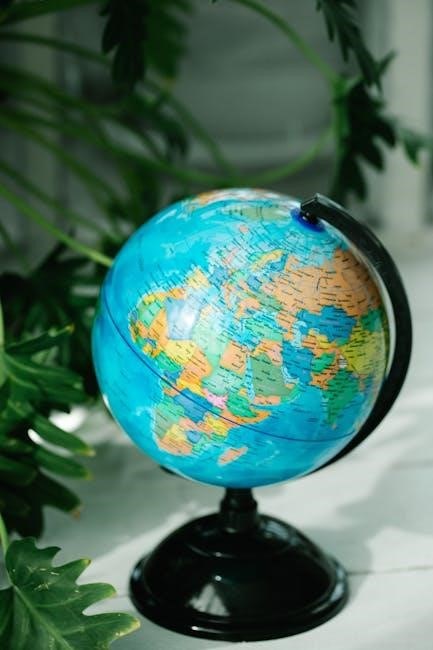
Impact of Warfare on Societies
Warfare profoundly impacts societies‚ causing widespread displacement‚ infrastructure destruction‚ and long-term societal instability‚ while reshaping cultural and political landscapes through loss and reconstruction efforts.
Economic Consequences: Destruction and Reconstruction
Warfare leads to significant economic destruction‚ including the loss of infrastructure‚ factories‚ and resources‚ disrupting production and supply chains. The cost of rebuilding economies after conflict strains national budgets‚ often diverting funds from essential services. Labor shortages arise due to casualties and displacement‚ further hampering economic recovery. However‚ reconstruction efforts can stimulate growth by creating jobs and investing in new technologies. Nations may also adopt economic reforms to prevent future instability. The economic consequences of warfare are profound‚ reshaping societies’ financial landscapes and influencing global trade dynamics for decades.
Social Impact: Civilian Casualties and Displacement
Global warfare has devastating social impacts‚ particularly through civilian casualties and mass displacement. Wars result in the loss of innocent lives‚ leaving families and communities traumatized. The destruction of homes and essential services forces millions to flee‚ creating refugee crises. Displacement disrupts social structures‚ leading to cultural erosion and long-term psychological trauma. Civilian suffering often persists post-conflict‚ as survivors face challenges in rebuilding their lives. The humanitarian toll of warfare underscores the need for global efforts to protect civilians and address displacement. These social impacts remain a critical concern in understanding the human cost of global conflicts.
Political Shifts: Rise and Fall of Empires
Global warfare has significantly influenced the rise and fall of empires‚ reshaping political landscapes. Wars often lead to the expansion or decline of empires‚ as victors gain territories while defeated powers lose influence. For instance‚ World War I resulted in the collapse of the Ottoman‚ Austro-Hungarian‚ and German empires‚ while World War II marked the decline of European colonial powers. The aftermath of these conflicts saw the emergence of new global powers‚ such as the United States and the Soviet Union‚ during the Cold War. Warfare accelerates political shifts‚ creating power vacuums that are filled by rising nations. These changes have lasting effects on international relations and global governance.

Technological Advancements in Warfare
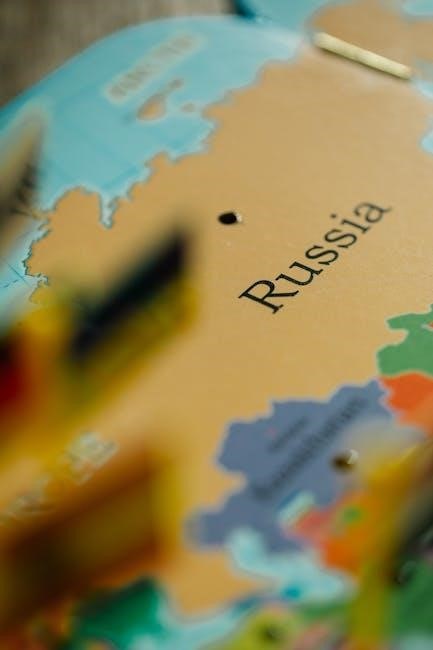
Technological advancements have revolutionized warfare‚ introducing weapons like tanks‚ aircraft‚ and guided missiles. Intelligence and espionage tools have also evolved‚ enhancing strategic capabilities and efficiency in modern conflicts.
Development of Modern Weaponry
The development of modern weaponry has drastically altered the nature of warfare. World War I introduced tanks‚ machine guns‚ and chemical weapons‚ while World War II saw the rise of atomic bombs. The Cold War era brought intercontinental ballistic missiles and nuclear arsenals. Modern conflicts feature precision-guided munitions‚ drones‚ and cyber warfare tools. These advancements have increased the lethality and efficiency of warfare‚ enabling nations to project power globally. The evolution of weaponry has also raised ethical concerns‚ as civilians often bear the brunt of technological advancements. Continuous innovation in weaponry has become a cornerstone of military strategy‚ shaping the future of global conflict.
Role of Intelligence and Espionage
Intelligence and espionage have played a pivotal role in global warfare‚ enabling nations to gain strategic advantages. The use of spies‚ codebreaking‚ and surveillance has allowed countries to anticipate enemy movements and secure critical information. During World War II‚ the decryption of the Enigma code significantly aided Allied forces. The Cold War saw the rise of espionage agencies like the CIA and KGB‚ with operatives infiltrating rival governments. Modern espionage employs advanced technologies‚ including satellites and cyber warfare‚ to gather intelligence. The effectiveness of intelligence operations often determines the outcome of conflicts‚ making it a cornerstone of military strategy. Its role in preventing surprise attacks and shaping diplomatic decisions continues to grow in importance;

Global Power Dynamics
Global power dynamics involve shifts in influence among nations‚ driven by economic‚ military‚ and political factors. The rise of new powers and decline of old empires reshape international relations.
Rise of New World Powers
The rise of new world powers has reshaped global dynamics‚ particularly after World War II. The United States and the Soviet Union emerged as superpowers‚ dominating international relations during the Cold War. Economic strength‚ industrial capabilities‚ and technological advancements propelled these nations to prominence. Decolonization also enabled countries in Asia‚ Africa‚ and the Middle East to gain independence‚ allowing some to become regional or global powers. In recent decades‚ nations like China‚ India‚ and Brazil have ascended due to rapid economic growth and integration into global trade. This shift reflects evolving geopolitical landscapes‚ marking a transition from a bipolar to a multipolar world.
Decline of Colonial Empires
The decline of colonial empires accelerated in the mid-20th century‚ particularly after World War II. European powers‚ economically drained by the war‚ struggled to maintain control over their colonies. Nationalist movements in colonized regions gained momentum‚ demanding independence. The United States and the Soviet Union‚ emerging as superpowers‚ often supported decolonization to expand their influence. The process was sometimes peaceful‚ such as India’s independence in 1947‚ but often violent‚ as seen in Algeria’s struggle against France. By the 1960s‚ most colonies had achieved independence‚ reshaping global power dynamics. This decline marked the end of centuries of European dominance and led to the rise of newly independent nations‚ altering international relations and global governance.
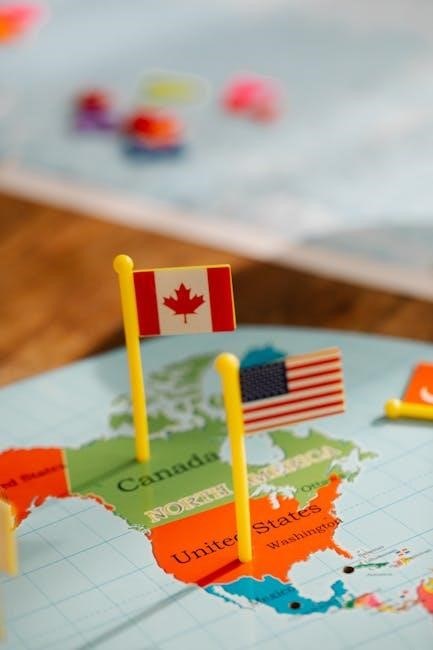
Role of International Organizations
International organizations play a crucial role in promoting global peace‚ cooperation‚ and governance. They address issues like trade‚ human rights‚ and conflict resolution‚ fostering dialogue among nations.
Formation of the League of Nations
The League of Nations was established in 1919 after World War I‚ primarily through the Treaty of Versailles. It aimed to promote international cooperation‚ prevent future wars‚ and resolve conflicts through diplomacy. The idea was championed by U.S. President Woodrow Wilson as part of his Fourteen Points. The League’s structure included a Council‚ an Assembly‚ and a Secretariat‚ with headquarters in Geneva‚ Switzerland. However‚ its effectiveness was limited by the absence of major powers like Germany initially‚ and later by the refusal of the United States to join. Despite its flaws‚ the League laid the groundwork for modern international organizations like the United Nations‚ emphasizing collective security and multilateralism.
United Nations and Global Governance
The United Nations (UN) was established in 1945 after World War II to maintain international peace and security. Its founding charter aimed to promote cooperation among nations‚ prevent conflict‚ and address global challenges. The UN replaced the League of Nations‚ addressing its predecessor’s shortcomings. Key components include the Security Council‚ General Assembly‚ and specialized agencies like WHO and UNESCO. The Security Council‚ with five permanent members holding veto power‚ plays a central role in conflict resolution. The UN emphasizes collective security‚ diplomacy‚ and humanitarian efforts‚ though its effectiveness is often limited by political divisions and reliance on member states for funding and enforcement. It remains a cornerstone of global governance‚ fostering dialogue and cooperation to address issues like climate change‚ human rights‚ and sustainable development.
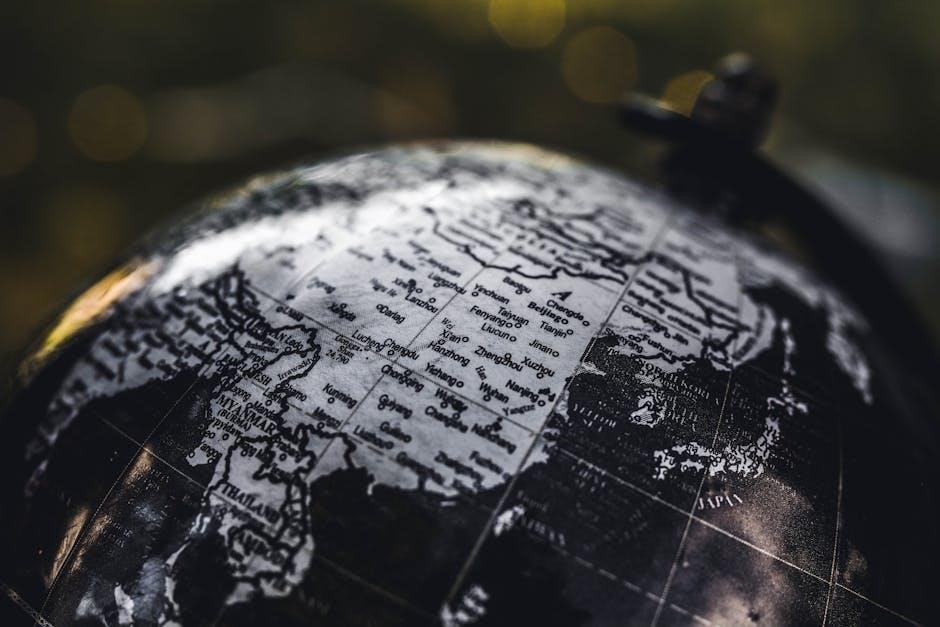
Legacy of Global Warfare
Global warfare reshaped alliances‚ spurred technological advancements‚ and influenced political ideologies. It highlighted the importance of diplomacy‚ leading to mechanisms for conflict resolution and international cooperation.
Long-term Effects on International Relations
Global warfare profoundly reshaped international relations‚ fostering a new global order and redefining alliances. The aftermath of World War I and II led to the rise of the United States and the Soviet Union as superpowers‚ while European empires declined. The Cold War intensified ideological divisions‚ creating a bipolar world dominated by realist geopolitics. These conflicts spurred the formation of international organizations like the United Nations to promote diplomacy and prevent future wars. Additionally‚ proxy wars and decolonization reshaped global power dynamics‚ leading to the emergence of new nations and shifting economic influences. These changes underscored the complexity of modern international relations‚ emphasizing the need for cooperation to address global challenges.
Lessons Learned and Modern Conflict Prevention
The devastating consequences of global warfare have led to significant lessons in conflict prevention and diplomacy. The establishment of international organizations like the United Nations has promoted multilateral cooperation to address disputes peacefully. Mechanisms such as peacekeeping missions‚ mediation‚ and sanctions aim to prevent escalation. Additionally‚ the emphasis on humanitarian law and human rights has mitigated civilian suffering. However‚ challenges persist‚ as geopolitical tensions and resource competition continue to drive conflicts. Modern approaches prioritize early intervention‚ dialogue‚ and economic incentives to deter aggression. These strategies reflect a global commitment to learning from past failures and fostering a more stable international order.